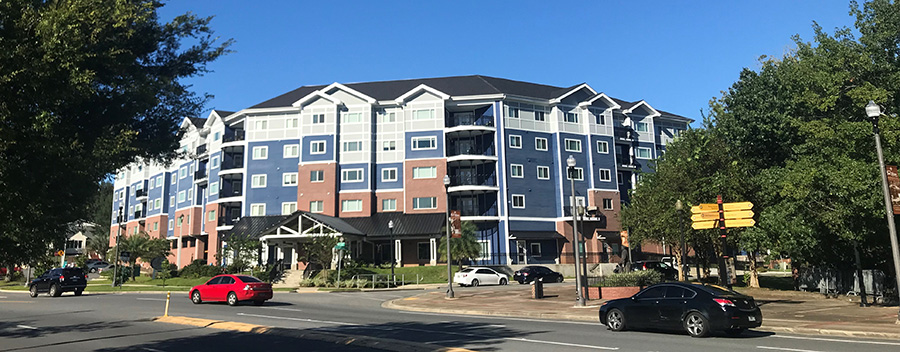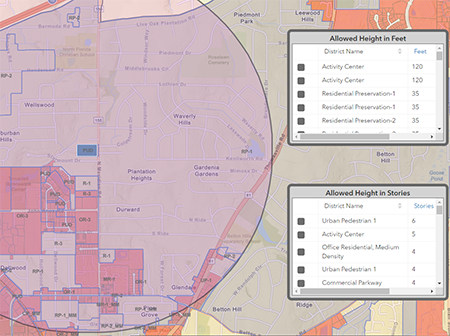Affordable Housing
The City of Tallahassee has developed, and continues to pursue, programs and incentives to support affordable housing availability in our community. The Growth Management Department, in coordination with the Housing and Community Resiliency Department, offers multiple incentives to aid affordable housing projects in Tallahassee. The term “Affordable Housing” is often used interchangeably with the term “Inclusionary Housing”, but there is an important difference.

The American Planning Association offers a useful discussion of inclusionary housing at its website. It notes the following:
"Inclusionary housing programs link affordable housing provision to private-sector development by requiring or incentivizing developers to construct affordable housing units as part of market-rate residential projects. Typically codified within the zoning ordinance, inclusionary housing policies include both mandatory requirements for new residential developments to include a certain percentage of affordable units, as well as voluntary programs that offer density bonuses or other regulatory or financial incentives in exchange for the production of new affordable units."
In other words, inclusionary housing focuses on the process used to create the affordable units. Inclusionary housing is a specific type of affordable housing that is created through a process based in the Zoning Code. The key idea of an inclusionary housing program is that it uses the Zoning Code to both mandate and incentivize a defined percentage of a project as affordable housing. The City has an Inclusionary Housing Ordinance that outlines the requirements and incentives for this housing type.
In contrast, the term “Affordable Housing” is more broad and describes a variety of possible affordable housing types. All proposed affordable or inclusionary housing projects are reviewed by City staff to determine eligibility for the local and state incentives that may be available.
Any new or existing development, whether for sale or for rent, may apply to receive affordable housing incentives. Eligibility review and certification is completed by the Housing and Community Resiliency Department. Eligibility for incentives and financial assistance is determined based on a variety of factors including, but not limited to, the number of dwelling units that will be provided as affordable, the household Area Median Income (AMI) range the housing will be available for, and the length of time the unit(s) will remain affordable. For more information on receiving project certification to obtain affordable housing incentives or financial assistance, visit the Housing and Community Resiliency Department.
The City of Tallahassee has had an Inclusionary Housing Ordinance since 2005. It requires all new residential developments with 50 or more housing units to sell at least 10% of their units at an affordable price for low- to moderate-income residents. The Inclusionary Housing Ordinance serves three purposes. First, it meets the requirements outlined in the Florida Statutes and the Tallahassee-Leon County Comprehensive Plan. Second, it increases affordable home ownership opportunities within the City. Third, it stimulates the private sector production of housing available to families within the range of 70 percent to 100 percent of the AMI, or lower. The ordinance is found in the City Code.
For more information on the Inclusionary Housing Ordinance, contact the Growth Management Department at 850-891-7100, option 4, or at zoning@talgov.com.
The Growth Management Department has several incentives available to assist with projects that are designated as inclusionary housing or certified as affordable housing. The incentives were developed to further support the creation of affordable housing within city limits. These incentives may include any of the following:
- Land use development application fees may be waived, with the exception of direct notice and legal advertising fee(s), if applicable. A list of all land use application types that may be eligible is online.
- The permits related to these projects are prioritized over non-certified projects through an expedited review process.
- Water and sewer impact fee waivers are available up to $7,500 per single family dwelling unit and $150,000 per multi-family development project.
- A 25 percent increase in allowable density is available above the otherwise established density of the applicable zoning district.
Each incentive listed above may have eligibility requirements or additional restrictions. For more information on these incentives, please contact the Growth Management Department at 850-891-7100, option 4, or at zoning@talgov.com.
In addition to local incentives and programs, the Florida legislature passed what is commonly referred to as 'The Live Local Act'. This Florida Statute went into effect on July 1, 2023, and was subsequently amended in May 2024. It contains policies aimed at assisting with the development of affordable housing in Florida through incentives such as providing funding opportunities, land use preemptions, tax incentives, and more.
The minimum criteria that must be met to be eligible for the Live Local Act incentives include the following:
- Must be located within commercial, industrial, and/or mixed-use zoning districts.
- At least 40% of units are affordable for households up to 120% AMI.
- If mixed-use, at least 65% of total square footage is residential.
- Affordability must remain for a minimum of 30 years.
The City's Growth Management Department has developed an online tool to assist in identifying areas within City limits that may qualify for the Live Local Act.
A project that wishes to become eligible for the Live Local Act incentives must contact the Growth Management Department to apply at 850-891-7100, option 4, or at zoning@talgov.com.
Once a project is determined eligible, the Growth Management Department will be able to approve the following land use incentives:
- Allow development of multifamily residential, or mixed-use, in all commercial, industrial, or mixed-use zoning districts without a zoning or land development change.
- Allow a development to utilize the maximum density allowed of any zoning district within the city limits. Currently, the highest density permitted within the City limits is 150 units/acre.
- Developments that are also eligible for the City's 25% density increase, may be able to utilize a maximum density of up to 187 dwelling units/acre.
- Developments proposed where residential is currently allowed may increase the intensity requirements to 150% of the highest currently allowed intensity standard in the City.
- Allow a development to utilize the same height standards as any applicable zoning district within one mile of the development, or 3 stories, whichever is higher. The maximum height can be utilized without requiring a Tallahassee Land Development Code change, Comprehensive Plan change, or Commission approval. The Growth Management Department's interactive map (linked above) depicts the potential allowable heights throughout the City.
- The Growth Management Department may also consider parking reduction requests if a project is within one half mile of a major transit stop.
All other state and local laws apply including, but not limited to, setbacks, parking, concurrency, lot coverage, and environmental standards. Other Tallahassee Land Development Code or Comprehensive Plan standards will also apply that may restrict the site from reaching maximum height and density.
The Live Local Act also offers several tax incentives and potential funding opportunities. For more information on funding and tax incentive opportunities provided by the Live Local Act, please contact the Housing and Community Resiliency Department at 850-891-6566 or housing@talgov.com.
 The Live Local Act, passed by the Florida Legislature in 2023, is a statewide strategy to increase affordable housing. If new development includes the required percentage of affordable units, as set by statute, buildings may be as tall as allowed in the highest zoning district within 1 mile. This webmap tool allows the user to select an eligible parcel and find the height allowed on it. The Live Local Act, passed by the Florida Legislature in 2023, is a statewide strategy to increase affordable housing. If new development includes the required percentage of affordable units, as set by statute, buildings may be as tall as allowed in the highest zoning district within 1 mile. This webmap tool allows the user to select an eligible parcel and find the height allowed on it.
Please note the 2024 Florida Legislature adopted the following amendment to the Live Local Act which could further limit maximum building height. Please contact the Growth Management office for a final determination of allowed height.
FS 166.04151(7)(d):
2. If the proposed development is adjacent to, on two or more sides, a parcel zoned for single-family residential use that is within a single-family residential development with at least 25 contiguous single-family homes, the municipality may restrict the height of the proposed development to 150 percent of the tallest building on any property adjacent to the proposed development, the highest currently allowed height for the property provided in the municipality’s land development regulations, or 3 stories, whichever is higher. For the purposes of this paragraph, the term “adjacent to” means those properties sharing more than one point of a property line, but does not include properties separated by a public road.
 Have a large-scale or unique project and are unsure where to start? The City of Tallahassee has an optional offering to further assist applicants in the development review process for certain projects. The Introduction Meeting is scheduled with a select group of supervisory City staff with the goal of establishing early lines of communication and coordination to ensure a clear and expedient path forward. Have a large-scale or unique project and are unsure where to start? The City of Tallahassee has an optional offering to further assist applicants in the development review process for certain projects. The Introduction Meeting is scheduled with a select group of supervisory City staff with the goal of establishing early lines of communication and coordination to ensure a clear and expedient path forward.
Below is a list of project types that may be eligible for an Introduction Meeting:
- Any project incorporating affordable housing
- Projects proposing 10,000 gross square feet or more of commercial space within the Multi-Modal Transportation District overlay
- Projects proposing 10 or more residential dwelling units within the Multi-Modal Transportation District overlay
- Projects contemplated on City of Tallahassee or Community Redevelopment Agency (CRA) property for sale
- Projects seeking CRA funding
Staff can guarantee availability for an Introduction Meeting within one week from the initial request, with the ability to accommodate a later meeting date as needed.
To schedule your Introduction Meeting, or to determine if your project is eligible for an Introduction Meeting, please contact Dylan Haase at 850-891-7165.
|